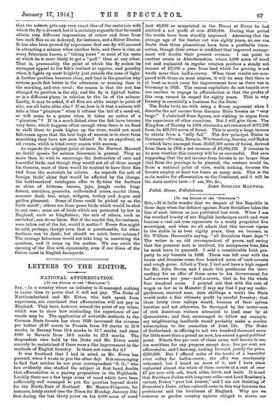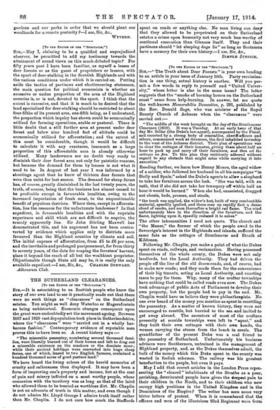[To ram Noma OF 1.■ •Tracr■roa..1
SIR,—It is little wonder that we despair of the Republic in these days when the defence against State Socialism takes the line of such letters as you published last week. When I are
the wrecked beauty of our English landscapes south and west because a vast oak tree represents to a needy proprietor fire sovereigns, and when we all admit that this harvest ripens to the sickle in at best eighty years, then we become, in Sir William Harcourt's saying, "all Socialists these days "I The writer is an old correspondent of yours, and seeing
that the personal note is involved, his anonymous bona fides he must leave to yourself. I sold a considerable Irish pro-
perty to my tenants in 1908. There was left over with the house and demesne some four hundred acres of 'cock coverts and rough gorse. Albeit a Tory, I had and have a high regard for Mr. John Burns, and I made this gentleman the inter- mediary for an offer of these acres to his Government for half-a-crown per year—half-a-crown, that is, for the whole four hundred acres. I pointed out that with the rate of wages as low as in Munster (I may say that I pay my under- gardeners, married men, nine shillings a week) the State would make a fine ultimata profit by careful forestry; that these lovely river valleys would, because of their sylvan beauties and not otherwise, be thronged by the motor-cars of rich American visitors attracted to land near by at Queenstown ; and that, encouraged to follow my example, my neighbouring landlords would probably make a similar subscription to the amenities of Irish life. The Duke of Sutherland, in offering to sell two hundred thousand acre. for little more than a pound an acre, has scored a good political point. Ninety-five per cent. of these acres, well known to me, are worthless for any purpose except deer; five per cent. are afforeetable, and I dare say, looking forward, justify the price, £200,000. But I offered miles of the banks of a beautiful river valley for half-a-crown ; the offer was courteously welcomed, but I beard no more of it, and I have since replanted almost the whole of these coverts at a cost of over £7 per acre with ash, black alder, birch, and larch. It is sad that Northern Dukes with long rent-rolls—not Lord Roeebery's variant, Dukes " poor but honest," and I am not thinking of Dunrobin's Duke, either—should come in this way between the proletariat and the loveliness of England. Why are we common or garden country squires obliged to starve our gardens and our parks in order that we should plant our woodlands for a remote posterity P—I am, Sir, &c., WYTEEN.











































 Previous page
Previous page